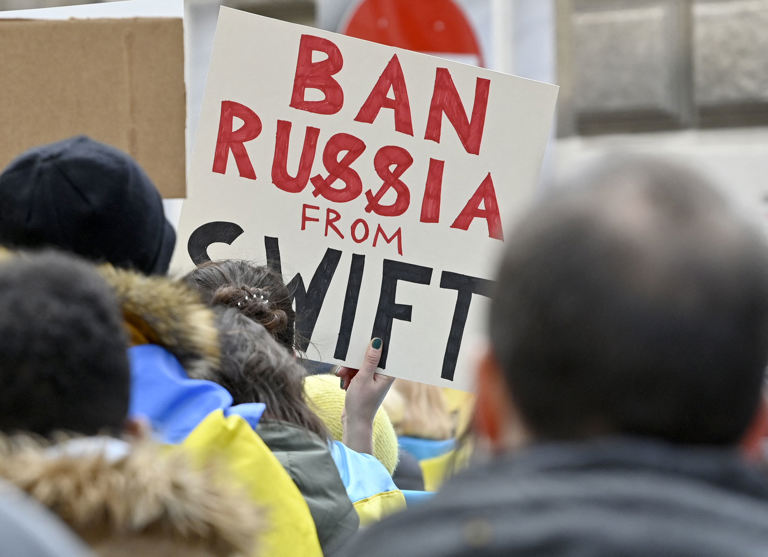What is SWIFT, the Society for Worldwide Interbank Financial Telecommunication?
One of the first serious points of division among Western nations on Russian sanctions in the Ukraine crisis is whether Russian financial institutions should be cut off from a global messaging system known as SWIFT. More than two dozen nations have agreed to impose sanctions but have not united around this latest proposal, which the French finance minister called a “financial nuclear weapon.” Here’s what you need to know about SWIFT and the debate about whether to pressure the network to exclude Russian financial institutions.
It is a messaging network that connects banks around the world and is considered the backbone of international finance. The Belgian-based consortium links more than 11,000 financial institutions operating in more than 200 countries and territories, acting as a critical hub to enable international payments. Last year, the system averaged 42 million messages a day, including orders and confirmations for payments, trades, and currency exchanges. More than 1 percent of those messages are thought to involve Russian payments.
What role might SWIFT play in the Russian invasion of Ukraine?
Eastern European countries and France are proposing an economic sanction that would cut Russia off from SWIFT. This would make it more difficult for Russian entities to process transactions and could hobble the Russian economy’s ability to do business beyond its borders. When Western nations threatened to use this sanction against Russia in 2014 — after it annexed Crimea — the country’s former finance minister Alexei Kudrin said it could reduce the country’s gross domestic product by 5 percent within a year. Russia’s gross domestic product was about $1.7 trillion last year, making it the 12th-largest economy in the world.
Are the 27 nations that have supported other sanctions against Russia backing the proposal to cut Russia off from SWIFT?
No. The proposed sanction represents one of the first points of serious Western division in this crisis. The U.S. has not gotten behind the proposal. However, President Biden has not ruled out calling for such a move. U.S. Treasury officials say it could damage Western businesses, especially major oil companies. Banks in the United States and Germany are the most frequent users of SWIFT to communicate with Russian banks, making the two countries especially vulnerable to fallout. Germany was opposed to the proposed sanction until Saturday when it said officials are now exploring the possibility and the impacts it might have.
If Russian banks are cut off from SWIFT, are there alternative networks they can use?
Yes. Russia created an alternative network, the System for Transfer of Financial Messages, but financial experts say it remains an inadequate replacement. By the end of 2020, the system included only 400 participants from 23 countries. There is also China’s Cross-Border Inter-Bank Payments System, which would allow both countries to bypass SWIFT. This is a greater concern, since China is the second-largest economy in the world, and any strengthening of this alternative system could erode the current dollar-dominated global financial system, undermining Western power.
Can Russia use cryptocurrency to evade sanctions if it loses access to the SWIFT network?
Because there is no central controller that has the power to act as a gatekeeper, crypto could be used for things like crowdfunding for the Ukrainian army or helping Russia evade sanctions. However, Russian cryptocurrency activity has historically paled in comparison to the transactions processed by its traditional financial institutions, so experts do not believe it could be used to fully replace SWIFT. Also, countries and their banking institutions that choose to help Russia evade this potential sanction could face negative consequences from dozens of nations across the world.
Who regulates SWIFT?
SWIFT is a consortium that is run by officials from its member banks, including the National Bank of Belgium, the U.S. Federal Reserve System, the Bank of England, the European Central Bank, and the Bank of Japan.
If Russia is cut off from SWIFT, would it be the first country to face this sanction?
No. Iranian financial institutions lost their access in 2012 after the European Union imposed sanctions on the nation over its nuclear program. As a result, it lost 30 percent of foreign trade. Iranian banks regained access after the country signed a 2015 agreement to limit its nuclear activities. They were cut off again in 2018 after the Trump administration killed the deal and pressured SWIFT to follow suit.
Razzan Nakhlawi contributed to this report.
Article Read Time
Avg Reading Time: 5 Minutes


